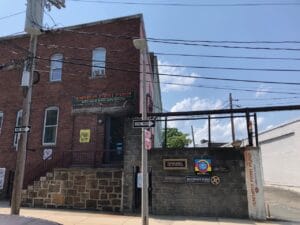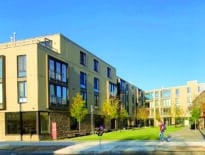
Artists at Dorchester-based Humphreys Street Studios launched a social media campaign in 2021 drawing attention to the potential sale of their property. Another developer now is seeking to acquire the property, retain the studios at existing rents and develop condominiums on a vacant portion of the site. Image courtesy of Humphrey Street Studios
Bill Madsen Hardy has a message for arts groups threatened with the loss of their creative spaces to rising rents and redevelopments: Give him a call.
Hardy, owner of Boston-based New Atlantic Development, has partnered with artists’ organizations from Jamaica Plain to Fort Point to prevent their studios from being converted into condominiums and other higher-income uses of real estate. The latest distress signal led Hardy to Dorchester, where more than 40 artists and craftspeople at Humphreys Street Studios are fighting to save their 19-year-old home in a former commercial dry cleaners.
“Every project is different,” said Hardy, who’s developed thousands of housing units including work at a Cambridge nonprofit. “They each have their own set of challenges and for every successful project we’ve been involved in, I can name two or three that didn’t work out. Oftentimes, the tenants didn’t reach out for help.”
The future of Humphreys Street Studios – which appeared to be dire just a few months ago with the potential sale to a Weston developer – appears brighter with a recent agreement for Hardy’s company to acquire the property for $3 million.
Artists Joe Wheelwright and Gneal Widett started the Uphams Corner studio in 2002, a year after acquiring the half-acre property for $100,000. After both co-founders passed away and their estates and partners put the property on the market, Weston-based Kendall Realty submitted a successful purchase-and-sale offer in a transaction originally scheduled to close in July.
Current tenants include fine artists, graphic designers, fabricators, carpenters and an architect. The potential change of ownership – and lack of response from their potential new landlord about future plans for the property – prompted them to launch a publicity campaign including social media and testimonials from public officials.

A developer has offered to buy the Humphrey Street Studios in Dorchester that more than 40 artists and craftspeople have occupied since 2001. Image courtesy of New Atlantic Development
After Kendall Realty’s offer expired, New Atlantic reentered the picture. Hardy had taken a look at the property two years ago, but was discouraged by several documented cases of environmental contamination related to the former laundry operation. The cases have now been resolved, he said, following a review by the state Department of Environmental Protection. And Hardy submitted his own offer on the property.
“This has just been an ongoing challenge for us to get to the point where the property is in the hands of the artists, and we’re grateful that we found a partner in New Atlantic,” said Cristina Todesco, a theater set designer and member of the studio’s preservation steering committee.
Housing as Subsidy for Art Space
The plan: to develop approximately 12 condominiums on a 10,000-square-foot vacant portion of the property to build equity for the acquisition and renovation of the studio building. Rents would remain unchanged for tenants, and a nonprofit would be formed to oversee the studio’s operation, Hardy said.
After finding a potential savior in New Atlantic, Humphreys Street Studios still has another hurdle to clear in a property dispute between their existing property owners and an abutter, the owners of the Diamond Doors & Windows factory. The lawsuit, filed in November 2019 in Massachusetts Land Court, claims that Humphreys Street has been using a small portion of the factory’s property for a driveway and parking, and installed a gate preventing Diamond Doors & Windows from using the section of land.
In a response and counterclaim, Humphreys Street Studios said use of the driveway dates back to the horse-drawn carriage era and they now own the section under the adverse possession legal doctrine.
The two sides agreed to mediation in a dispute resolution process now scheduled for a hearing on Feb. 3.
Can It Work Elsewhere?
Even assuming a successful resolution of the lawsuit, Humphrey Street Studios’ story isn’t a one-size-fits-all blueprint for saving arts space in Boston. The Mayor’s Office of Arts and Culture has informally agreed to subsidize $500,000 of the acquisition costs, Hardy said, and not all properties have excess land for lucrative additional development.
Kara Elliott-Ortega, Boston’s chief of arts and culture, said the city doesn’t have specific sources of funding for subsidizing arts space. But the office is studying some potential permanent models to meet its goal: “no net loss of cultural space in Boston.”

Steve Adams
Among the options: city funding for capital projects benefiting existing properties, a public agency that owns and rents affordable arts space, and zoning requirements for arts facilities in developments. Mayor Michelle Wu endorsed the zoning changes in her campaign platform.
And next year, the Mayor’s Office of Arts and Culture will launch a pilot program providing technical support and business development services for artists and groups that need help starting and managing their own spaces. The program is designed to help cultural groups operate arts spaces profitably, as new developments such as Berkeley Investments’ 176 Lincoln St. set aside ground floor space as a community benefit, Elliott-Ortega said.
Arts groups’ lack of real estate expertise often discourages lenders from backing projects, New Atlantic’s Hardy said.
“They need a developer or real estate company to come in and manage it, and they usually require that we sit on the boards as well to bring some real estate professionalism to the board,” he said. “Other times we have to guarantee the commercial debt, so we have a financial risk and stay involved.”




 |
| 
